CHTM 36: Critical Theories and Methods in Tourism & Events
VerifiedAdded on 2023/05/29
|17
|4881
|145
Report
AI Summary
This report offers a critical assessment of two journal articles related to the tourism, hospitality, and events sectors. The first article examines entrepreneurial change in Cuba's tourism industry, focusing on perceived barriers and facilitators for private enterprises. The analysis uses a functionalism approach but critiques the limited sample size and representation. The second article explores the impacts of the World Golf Championships on Shanghai residents, employing an empirical study with over 1200 participants. It highlights the importance of understanding residents' perspectives on major sports events and calls for comprehensive research beyond economic impact. The report evaluates each article's theoretical, philosophical, and methodological approaches to determine the effectiveness of the studies.
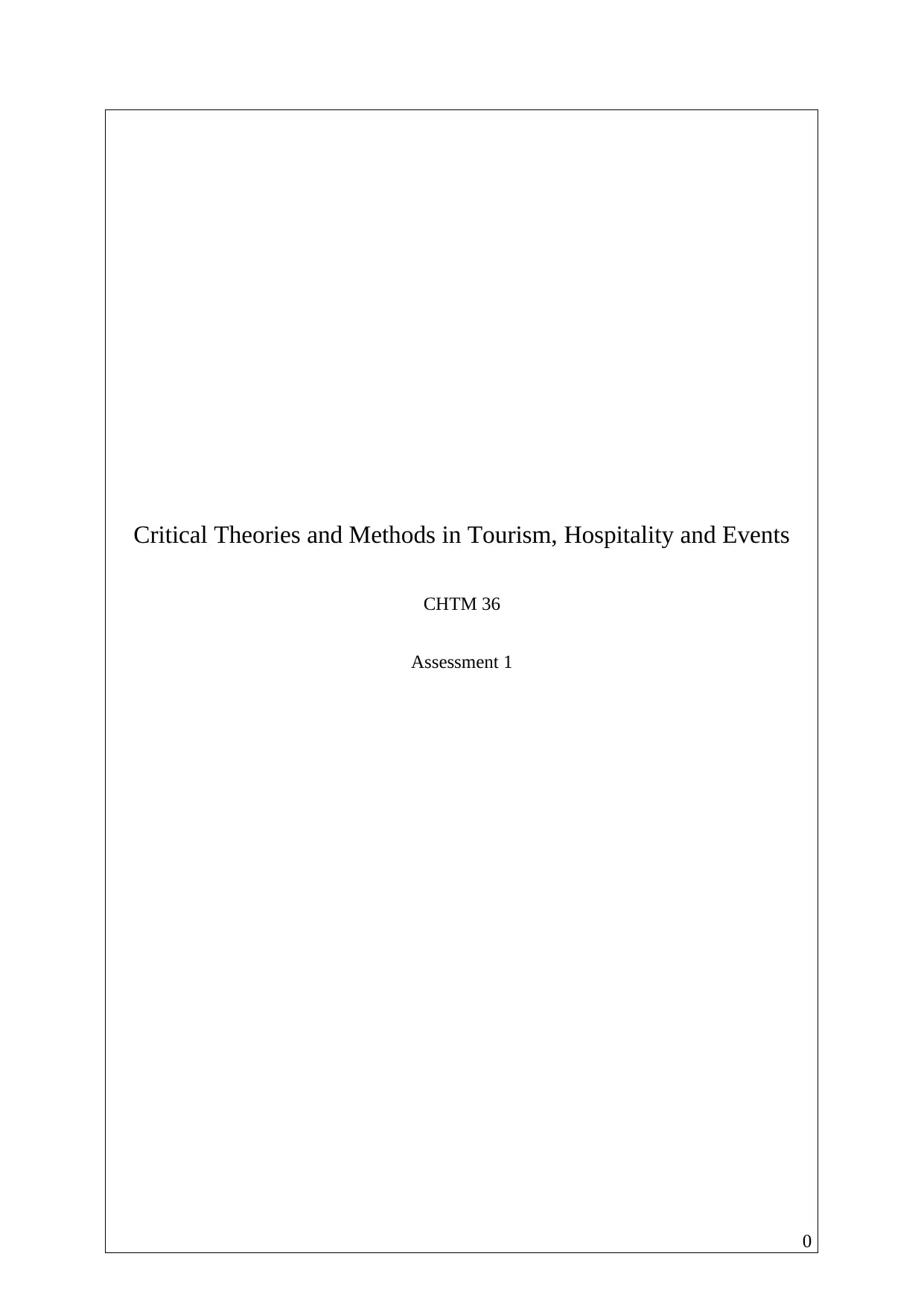
Critical Theories and Methods in Tourism, Hospitality and Events
CHTM 36
Assessment 1
0
CHTM 36
Assessment 1
0
Paraphrase This Document
Need a fresh take? Get an instant paraphrase of this document with our AI Paraphraser
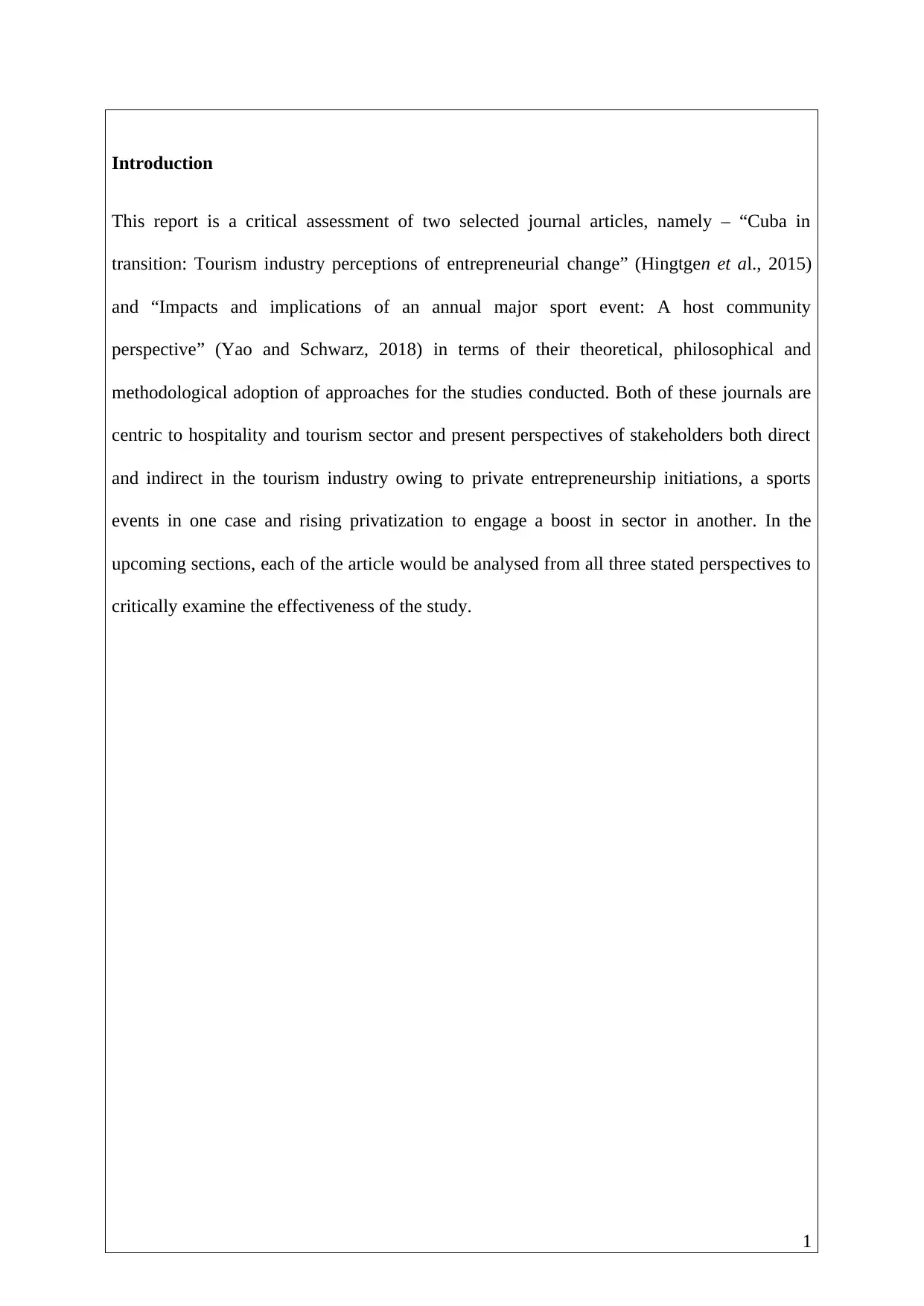
Introduction
This report is a critical assessment of two selected journal articles, namely – “Cuba in
transition: Tourism industry perceptions of entrepreneurial change” (Hingtgen et al., 2015)
and “Impacts and implications of an annual major sport event: A host community
perspective” (Yao and Schwarz, 2018) in terms of their theoretical, philosophical and
methodological adoption of approaches for the studies conducted. Both of these journals are
centric to hospitality and tourism sector and present perspectives of stakeholders both direct
and indirect in the tourism industry owing to private entrepreneurship initiations, a sports
events in one case and rising privatization to engage a boost in sector in another. In the
upcoming sections, each of the article would be analysed from all three stated perspectives to
critically examine the effectiveness of the study.
1
This report is a critical assessment of two selected journal articles, namely – “Cuba in
transition: Tourism industry perceptions of entrepreneurial change” (Hingtgen et al., 2015)
and “Impacts and implications of an annual major sport event: A host community
perspective” (Yao and Schwarz, 2018) in terms of their theoretical, philosophical and
methodological adoption of approaches for the studies conducted. Both of these journals are
centric to hospitality and tourism sector and present perspectives of stakeholders both direct
and indirect in the tourism industry owing to private entrepreneurship initiations, a sports
events in one case and rising privatization to engage a boost in sector in another. In the
upcoming sections, each of the article would be analysed from all three stated perspectives to
critically examine the effectiveness of the study.
1
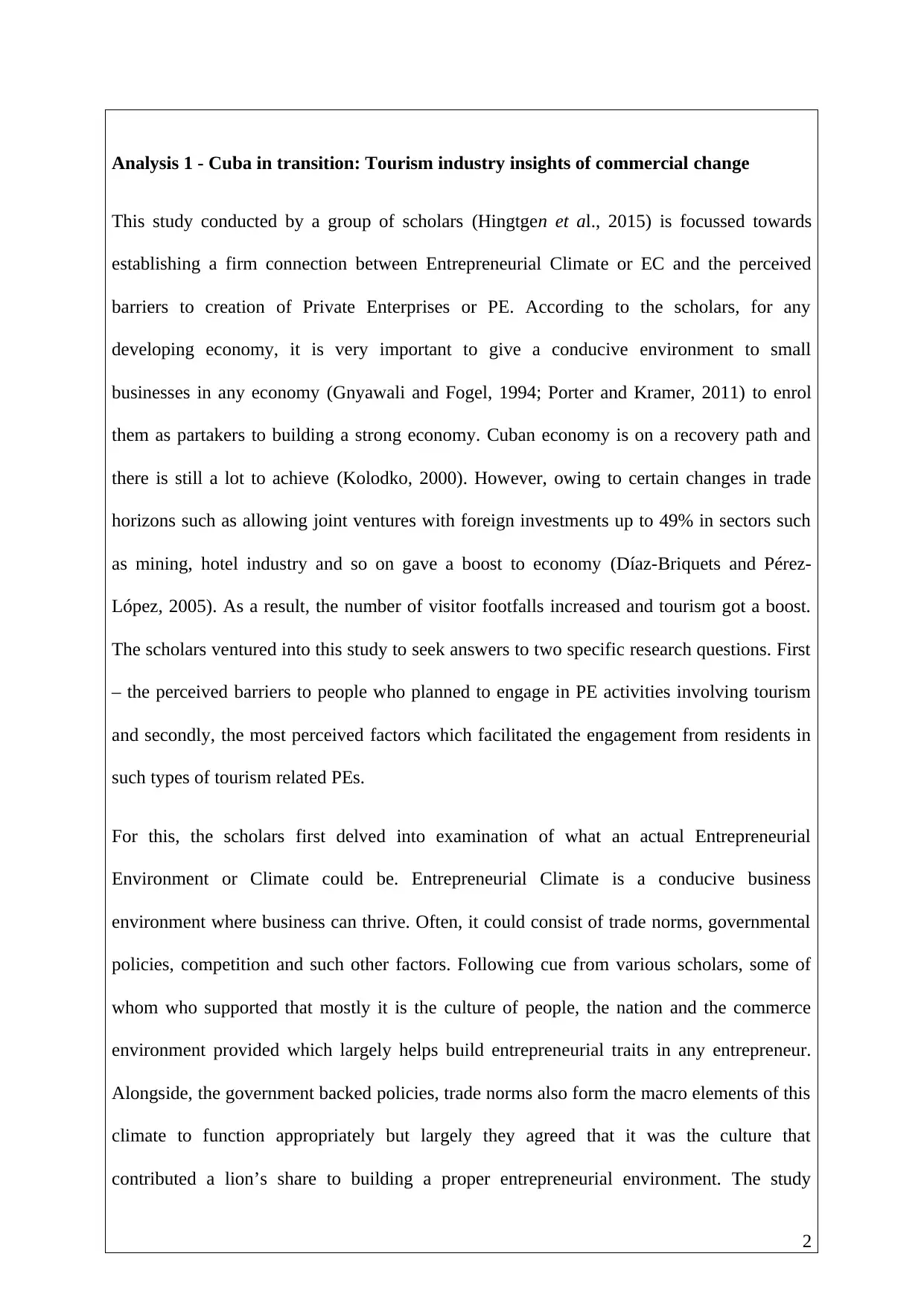
Analysis 1 - Cuba in transition: Tourism industry insights of commercial change
This study conducted by a group of scholars (Hingtgen et al., 2015) is focussed towards
establishing a firm connection between Entrepreneurial Climate or EC and the perceived
barriers to creation of Private Enterprises or PE. According to the scholars, for any
developing economy, it is very important to give a conducive environment to small
businesses in any economy (Gnyawali and Fogel, 1994; Porter and Kramer, 2011) to enrol
them as partakers to building a strong economy. Cuban economy is on a recovery path and
there is still a lot to achieve (Kolodko, 2000). However, owing to certain changes in trade
horizons such as allowing joint ventures with foreign investments up to 49% in sectors such
as mining, hotel industry and so on gave a boost to economy (Díaz-Briquets and Pérez-
López, 2005). As a result, the number of visitor footfalls increased and tourism got a boost.
The scholars ventured into this study to seek answers to two specific research questions. First
– the perceived barriers to people who planned to engage in PE activities involving tourism
and secondly, the most perceived factors which facilitated the engagement from residents in
such types of tourism related PEs.
For this, the scholars first delved into examination of what an actual Entrepreneurial
Environment or Climate could be. Entrepreneurial Climate is a conducive business
environment where business can thrive. Often, it could consist of trade norms, governmental
policies, competition and such other factors. Following cue from various scholars, some of
whom who supported that mostly it is the culture of people, the nation and the commerce
environment provided which largely helps build entrepreneurial traits in any entrepreneur.
Alongside, the government backed policies, trade norms also form the macro elements of this
climate to function appropriately but largely they agreed that it was the culture that
contributed a lion’s share to building a proper entrepreneurial environment. The study
2
This study conducted by a group of scholars (Hingtgen et al., 2015) is focussed towards
establishing a firm connection between Entrepreneurial Climate or EC and the perceived
barriers to creation of Private Enterprises or PE. According to the scholars, for any
developing economy, it is very important to give a conducive environment to small
businesses in any economy (Gnyawali and Fogel, 1994; Porter and Kramer, 2011) to enrol
them as partakers to building a strong economy. Cuban economy is on a recovery path and
there is still a lot to achieve (Kolodko, 2000). However, owing to certain changes in trade
horizons such as allowing joint ventures with foreign investments up to 49% in sectors such
as mining, hotel industry and so on gave a boost to economy (Díaz-Briquets and Pérez-
López, 2005). As a result, the number of visitor footfalls increased and tourism got a boost.
The scholars ventured into this study to seek answers to two specific research questions. First
– the perceived barriers to people who planned to engage in PE activities involving tourism
and secondly, the most perceived factors which facilitated the engagement from residents in
such types of tourism related PEs.
For this, the scholars first delved into examination of what an actual Entrepreneurial
Environment or Climate could be. Entrepreneurial Climate is a conducive business
environment where business can thrive. Often, it could consist of trade norms, governmental
policies, competition and such other factors. Following cue from various scholars, some of
whom who supported that mostly it is the culture of people, the nation and the commerce
environment provided which largely helps build entrepreneurial traits in any entrepreneur.
Alongside, the government backed policies, trade norms also form the macro elements of this
climate to function appropriately but largely they agreed that it was the culture that
contributed a lion’s share to building a proper entrepreneurial environment. The study
2
⊘ This is a preview!⊘
Do you want full access?
Subscribe today to unlock all pages.

Trusted by 1+ million students worldwide
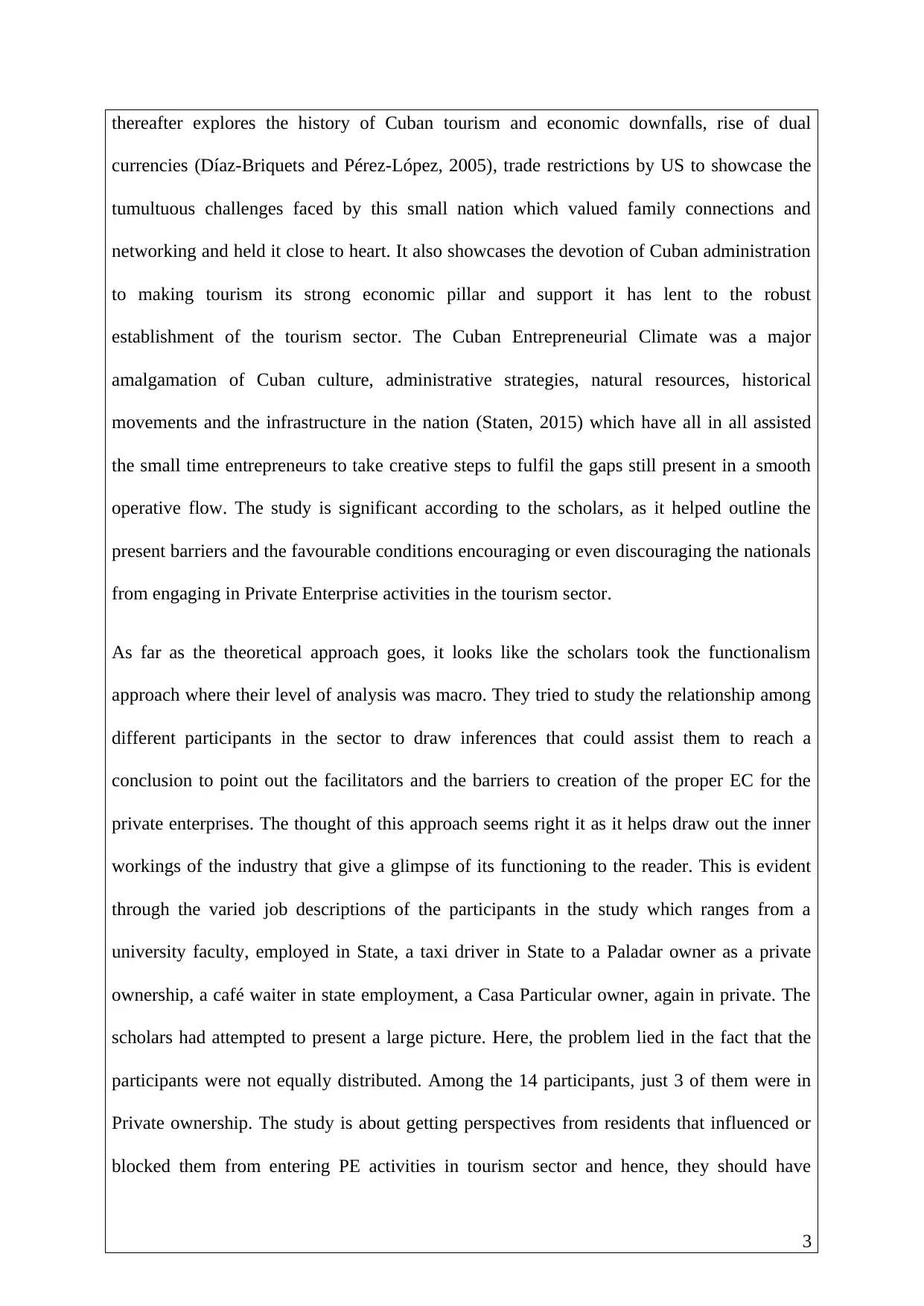
thereafter explores the history of Cuban tourism and economic downfalls, rise of dual
currencies (Díaz-Briquets and Pérez-López, 2005), trade restrictions by US to showcase the
tumultuous challenges faced by this small nation which valued family connections and
networking and held it close to heart. It also showcases the devotion of Cuban administration
to making tourism its strong economic pillar and support it has lent to the robust
establishment of the tourism sector. The Cuban Entrepreneurial Climate was a major
amalgamation of Cuban culture, administrative strategies, natural resources, historical
movements and the infrastructure in the nation (Staten, 2015) which have all in all assisted
the small time entrepreneurs to take creative steps to fulfil the gaps still present in a smooth
operative flow. The study is significant according to the scholars, as it helped outline the
present barriers and the favourable conditions encouraging or even discouraging the nationals
from engaging in Private Enterprise activities in the tourism sector.
As far as the theoretical approach goes, it looks like the scholars took the functionalism
approach where their level of analysis was macro. They tried to study the relationship among
different participants in the sector to draw inferences that could assist them to reach a
conclusion to point out the facilitators and the barriers to creation of the proper EC for the
private enterprises. The thought of this approach seems right it as it helps draw out the inner
workings of the industry that give a glimpse of its functioning to the reader. This is evident
through the varied job descriptions of the participants in the study which ranges from a
university faculty, employed in State, a taxi driver in State to a Paladar owner as a private
ownership, a café waiter in state employment, a Casa Particular owner, again in private. The
scholars had attempted to present a large picture. Here, the problem lied in the fact that the
participants were not equally distributed. Among the 14 participants, just 3 of them were in
Private ownership. The study is about getting perspectives from residents that influenced or
blocked them from entering PE activities in tourism sector and hence, they should have
3
currencies (Díaz-Briquets and Pérez-López, 2005), trade restrictions by US to showcase the
tumultuous challenges faced by this small nation which valued family connections and
networking and held it close to heart. It also showcases the devotion of Cuban administration
to making tourism its strong economic pillar and support it has lent to the robust
establishment of the tourism sector. The Cuban Entrepreneurial Climate was a major
amalgamation of Cuban culture, administrative strategies, natural resources, historical
movements and the infrastructure in the nation (Staten, 2015) which have all in all assisted
the small time entrepreneurs to take creative steps to fulfil the gaps still present in a smooth
operative flow. The study is significant according to the scholars, as it helped outline the
present barriers and the favourable conditions encouraging or even discouraging the nationals
from engaging in Private Enterprise activities in the tourism sector.
As far as the theoretical approach goes, it looks like the scholars took the functionalism
approach where their level of analysis was macro. They tried to study the relationship among
different participants in the sector to draw inferences that could assist them to reach a
conclusion to point out the facilitators and the barriers to creation of the proper EC for the
private enterprises. The thought of this approach seems right it as it helps draw out the inner
workings of the industry that give a glimpse of its functioning to the reader. This is evident
through the varied job descriptions of the participants in the study which ranges from a
university faculty, employed in State, a taxi driver in State to a Paladar owner as a private
ownership, a café waiter in state employment, a Casa Particular owner, again in private. The
scholars had attempted to present a large picture. Here, the problem lied in the fact that the
participants were not equally distributed. Among the 14 participants, just 3 of them were in
Private ownership. The study is about getting perspectives from residents that influenced or
blocked them from entering PE activities in tourism sector and hence, they should have
3
Paraphrase This Document
Need a fresh take? Get an instant paraphrase of this document with our AI Paraphraser
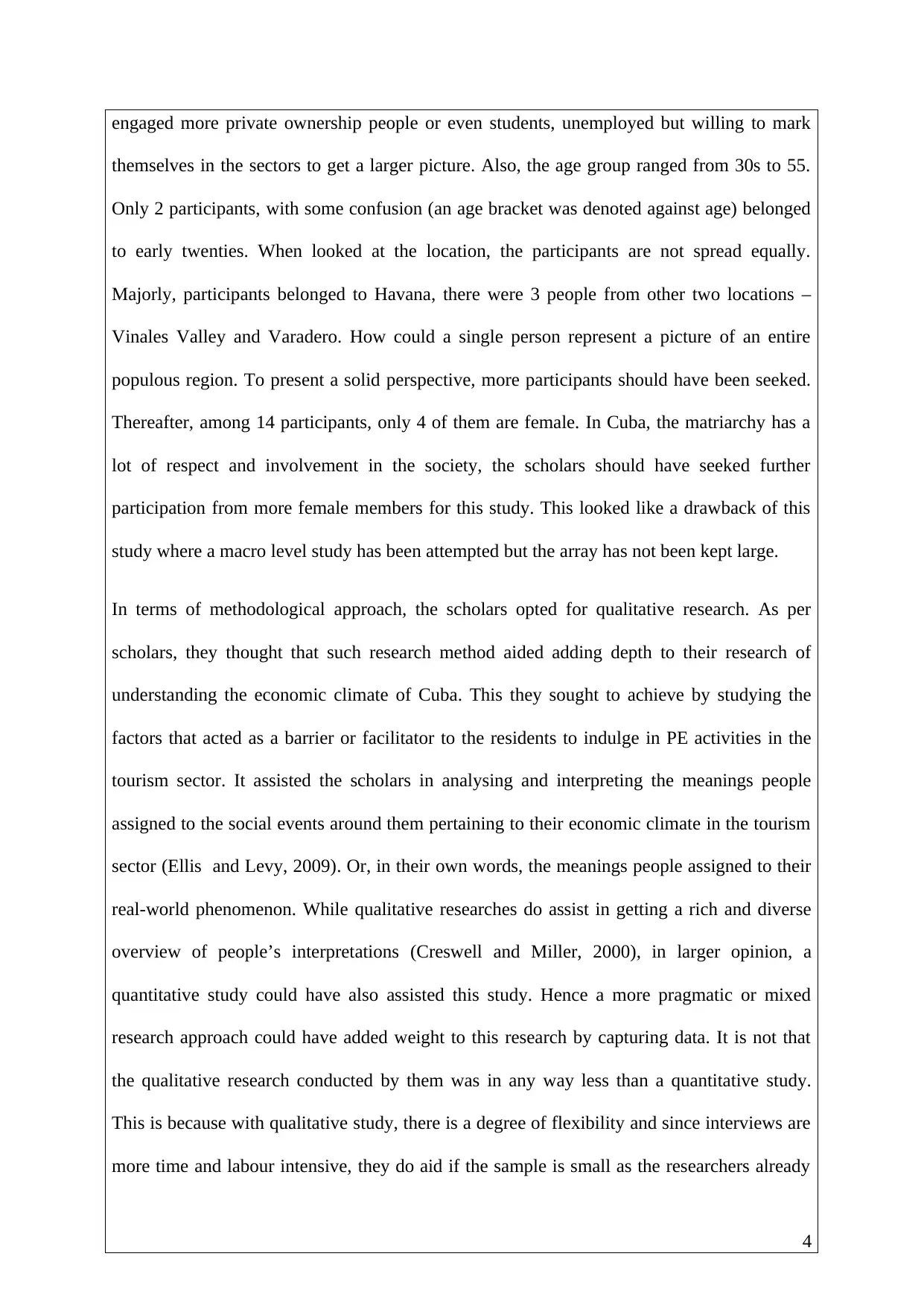
engaged more private ownership people or even students, unemployed but willing to mark
themselves in the sectors to get a larger picture. Also, the age group ranged from 30s to 55.
Only 2 participants, with some confusion (an age bracket was denoted against age) belonged
to early twenties. When looked at the location, the participants are not spread equally.
Majorly, participants belonged to Havana, there were 3 people from other two locations –
Vinales Valley and Varadero. How could a single person represent a picture of an entire
populous region. To present a solid perspective, more participants should have been seeked.
Thereafter, among 14 participants, only 4 of them are female. In Cuba, the matriarchy has a
lot of respect and involvement in the society, the scholars should have seeked further
participation from more female members for this study. This looked like a drawback of this
study where a macro level study has been attempted but the array has not been kept large.
In terms of methodological approach, the scholars opted for qualitative research. As per
scholars, they thought that such research method aided adding depth to their research of
understanding the economic climate of Cuba. This they sought to achieve by studying the
factors that acted as a barrier or facilitator to the residents to indulge in PE activities in the
tourism sector. It assisted the scholars in analysing and interpreting the meanings people
assigned to the social events around them pertaining to their economic climate in the tourism
sector (Ellis and Levy, 2009). Or, in their own words, the meanings people assigned to their
real-world phenomenon. While qualitative researches do assist in getting a rich and diverse
overview of people’s interpretations (Creswell and Miller, 2000), in larger opinion, a
quantitative study could have also assisted this study. Hence a more pragmatic or mixed
research approach could have added weight to this research by capturing data. It is not that
the qualitative research conducted by them was in any way less than a quantitative study.
This is because with qualitative study, there is a degree of flexibility and since interviews are
more time and labour intensive, they do aid if the sample is small as the researchers already
4
themselves in the sectors to get a larger picture. Also, the age group ranged from 30s to 55.
Only 2 participants, with some confusion (an age bracket was denoted against age) belonged
to early twenties. When looked at the location, the participants are not spread equally.
Majorly, participants belonged to Havana, there were 3 people from other two locations –
Vinales Valley and Varadero. How could a single person represent a picture of an entire
populous region. To present a solid perspective, more participants should have been seeked.
Thereafter, among 14 participants, only 4 of them are female. In Cuba, the matriarchy has a
lot of respect and involvement in the society, the scholars should have seeked further
participation from more female members for this study. This looked like a drawback of this
study where a macro level study has been attempted but the array has not been kept large.
In terms of methodological approach, the scholars opted for qualitative research. As per
scholars, they thought that such research method aided adding depth to their research of
understanding the economic climate of Cuba. This they sought to achieve by studying the
factors that acted as a barrier or facilitator to the residents to indulge in PE activities in the
tourism sector. It assisted the scholars in analysing and interpreting the meanings people
assigned to the social events around them pertaining to their economic climate in the tourism
sector (Ellis and Levy, 2009). Or, in their own words, the meanings people assigned to their
real-world phenomenon. While qualitative researches do assist in getting a rich and diverse
overview of people’s interpretations (Creswell and Miller, 2000), in larger opinion, a
quantitative study could have also assisted this study. Hence a more pragmatic or mixed
research approach could have added weight to this research by capturing data. It is not that
the qualitative research conducted by them was in any way less than a quantitative study.
This is because with qualitative study, there is a degree of flexibility and since interviews are
more time and labour intensive, they do aid if the sample is small as the researchers already
4
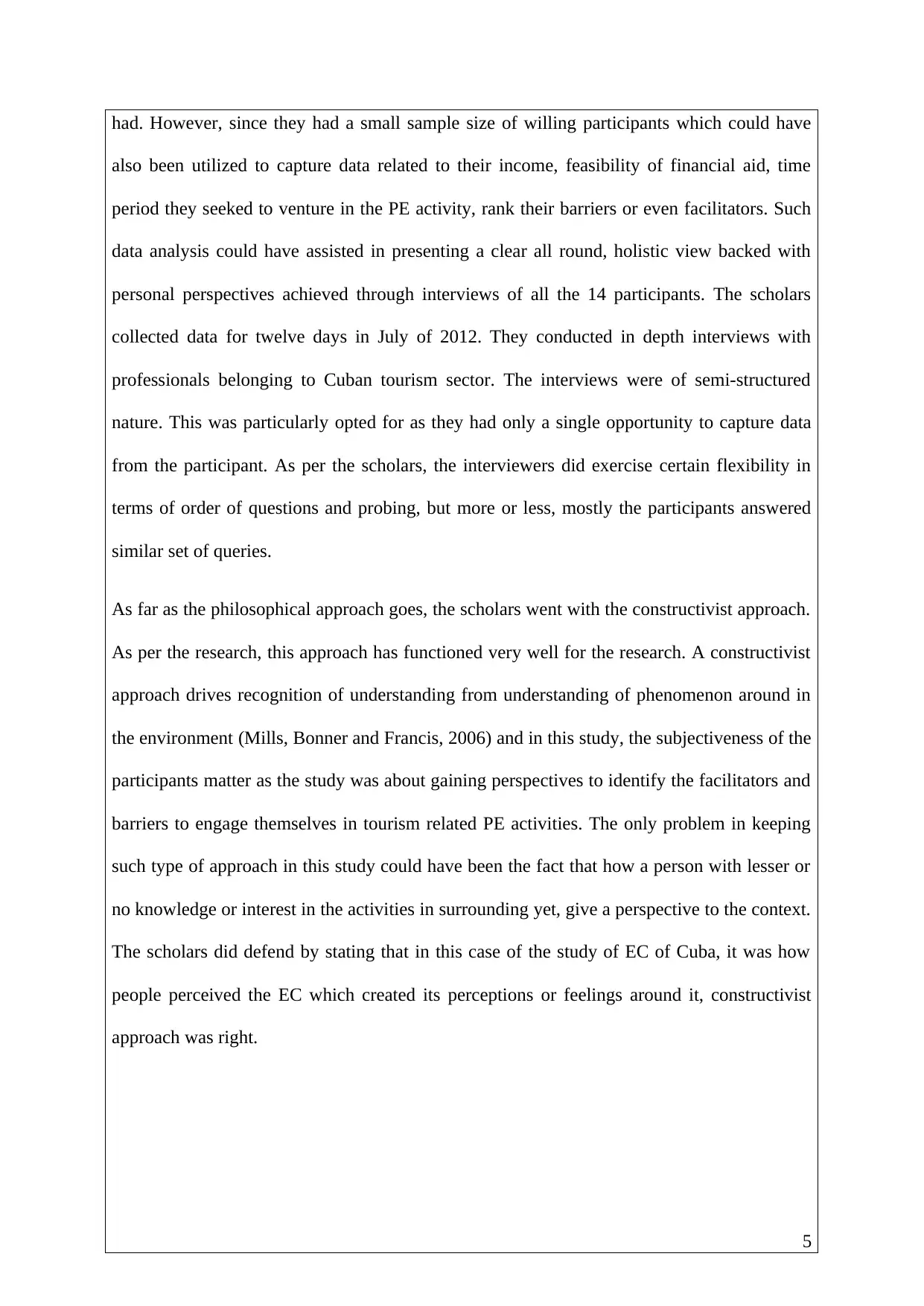
had. However, since they had a small sample size of willing participants which could have
also been utilized to capture data related to their income, feasibility of financial aid, time
period they seeked to venture in the PE activity, rank their barriers or even facilitators. Such
data analysis could have assisted in presenting a clear all round, holistic view backed with
personal perspectives achieved through interviews of all the 14 participants. The scholars
collected data for twelve days in July of 2012. They conducted in depth interviews with
professionals belonging to Cuban tourism sector. The interviews were of semi-structured
nature. This was particularly opted for as they had only a single opportunity to capture data
from the participant. As per the scholars, the interviewers did exercise certain flexibility in
terms of order of questions and probing, but more or less, mostly the participants answered
similar set of queries.
As far as the philosophical approach goes, the scholars went with the constructivist approach.
As per the research, this approach has functioned very well for the research. A constructivist
approach drives recognition of understanding from understanding of phenomenon around in
the environment (Mills, Bonner and Francis, 2006) and in this study, the subjectiveness of the
participants matter as the study was about gaining perspectives to identify the facilitators and
barriers to engage themselves in tourism related PE activities. The only problem in keeping
such type of approach in this study could have been the fact that how a person with lesser or
no knowledge or interest in the activities in surrounding yet, give a perspective to the context.
The scholars did defend by stating that in this case of the study of EC of Cuba, it was how
people perceived the EC which created its perceptions or feelings around it, constructivist
approach was right.
5
also been utilized to capture data related to their income, feasibility of financial aid, time
period they seeked to venture in the PE activity, rank their barriers or even facilitators. Such
data analysis could have assisted in presenting a clear all round, holistic view backed with
personal perspectives achieved through interviews of all the 14 participants. The scholars
collected data for twelve days in July of 2012. They conducted in depth interviews with
professionals belonging to Cuban tourism sector. The interviews were of semi-structured
nature. This was particularly opted for as they had only a single opportunity to capture data
from the participant. As per the scholars, the interviewers did exercise certain flexibility in
terms of order of questions and probing, but more or less, mostly the participants answered
similar set of queries.
As far as the philosophical approach goes, the scholars went with the constructivist approach.
As per the research, this approach has functioned very well for the research. A constructivist
approach drives recognition of understanding from understanding of phenomenon around in
the environment (Mills, Bonner and Francis, 2006) and in this study, the subjectiveness of the
participants matter as the study was about gaining perspectives to identify the facilitators and
barriers to engage themselves in tourism related PE activities. The only problem in keeping
such type of approach in this study could have been the fact that how a person with lesser or
no knowledge or interest in the activities in surrounding yet, give a perspective to the context.
The scholars did defend by stating that in this case of the study of EC of Cuba, it was how
people perceived the EC which created its perceptions or feelings around it, constructivist
approach was right.
5
⊘ This is a preview!⊘
Do you want full access?
Subscribe today to unlock all pages.

Trusted by 1+ million students worldwide
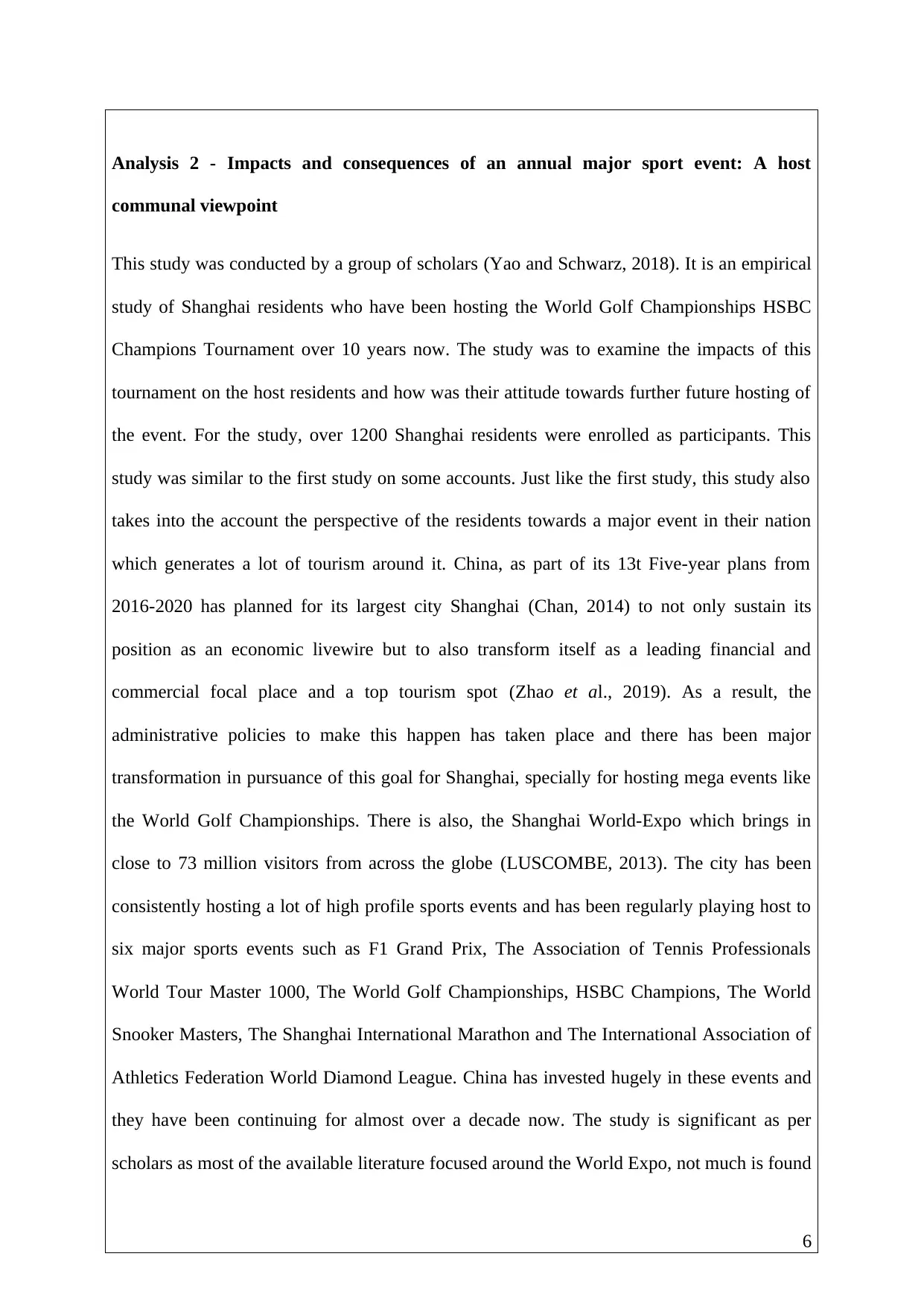
Analysis 2 - Impacts and consequences of an annual major sport event: A host
communal viewpoint
This study was conducted by a group of scholars (Yao and Schwarz, 2018). It is an empirical
study of Shanghai residents who have been hosting the World Golf Championships HSBC
Champions Tournament over 10 years now. The study was to examine the impacts of this
tournament on the host residents and how was their attitude towards further future hosting of
the event. For the study, over 1200 Shanghai residents were enrolled as participants. This
study was similar to the first study on some accounts. Just like the first study, this study also
takes into the account the perspective of the residents towards a major event in their nation
which generates a lot of tourism around it. China, as part of its 13t Five-year plans from
2016-2020 has planned for its largest city Shanghai (Chan, 2014) to not only sustain its
position as an economic livewire but to also transform itself as a leading financial and
commercial focal place and a top tourism spot (Zhao et al., 2019). As a result, the
administrative policies to make this happen has taken place and there has been major
transformation in pursuance of this goal for Shanghai, specially for hosting mega events like
the World Golf Championships. There is also, the Shanghai World-Expo which brings in
close to 73 million visitors from across the globe (LUSCOMBE, 2013). The city has been
consistently hosting a lot of high profile sports events and has been regularly playing host to
six major sports events such as F1 Grand Prix, The Association of Tennis Professionals
World Tour Master 1000, The World Golf Championships, HSBC Champions, The World
Snooker Masters, The Shanghai International Marathon and The International Association of
Athletics Federation World Diamond League. China has invested hugely in these events and
they have been continuing for almost over a decade now. The study is significant as per
scholars as most of the available literature focused around the World Expo, not much is found
6
communal viewpoint
This study was conducted by a group of scholars (Yao and Schwarz, 2018). It is an empirical
study of Shanghai residents who have been hosting the World Golf Championships HSBC
Champions Tournament over 10 years now. The study was to examine the impacts of this
tournament on the host residents and how was their attitude towards further future hosting of
the event. For the study, over 1200 Shanghai residents were enrolled as participants. This
study was similar to the first study on some accounts. Just like the first study, this study also
takes into the account the perspective of the residents towards a major event in their nation
which generates a lot of tourism around it. China, as part of its 13t Five-year plans from
2016-2020 has planned for its largest city Shanghai (Chan, 2014) to not only sustain its
position as an economic livewire but to also transform itself as a leading financial and
commercial focal place and a top tourism spot (Zhao et al., 2019). As a result, the
administrative policies to make this happen has taken place and there has been major
transformation in pursuance of this goal for Shanghai, specially for hosting mega events like
the World Golf Championships. There is also, the Shanghai World-Expo which brings in
close to 73 million visitors from across the globe (LUSCOMBE, 2013). The city has been
consistently hosting a lot of high profile sports events and has been regularly playing host to
six major sports events such as F1 Grand Prix, The Association of Tennis Professionals
World Tour Master 1000, The World Golf Championships, HSBC Champions, The World
Snooker Masters, The Shanghai International Marathon and The International Association of
Athletics Federation World Diamond League. China has invested hugely in these events and
they have been continuing for almost over a decade now. The study is significant as per
scholars as most of the available literature focused around the World Expo, not much is found
6
Paraphrase This Document
Need a fresh take? Get an instant paraphrase of this document with our AI Paraphraser
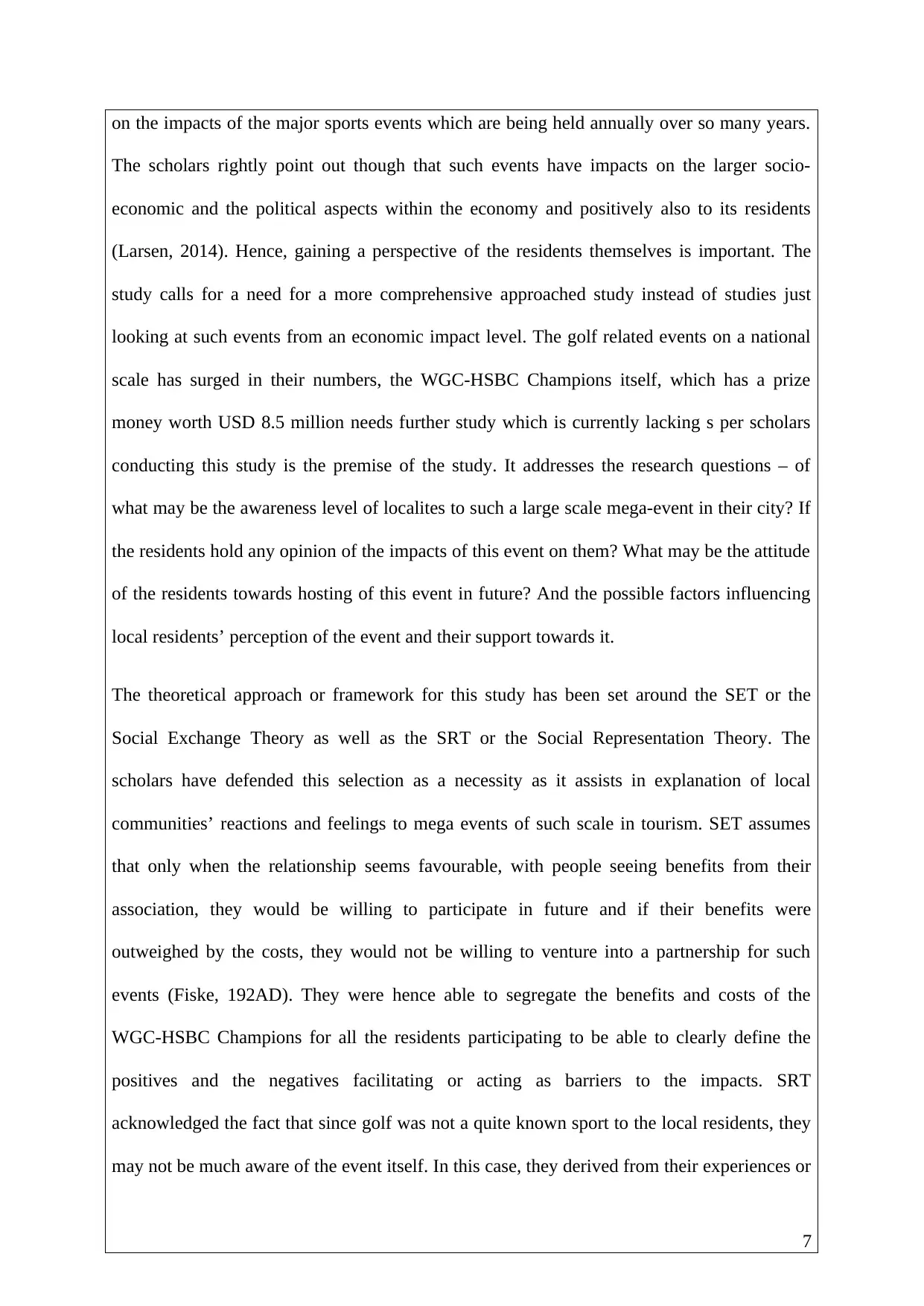
on the impacts of the major sports events which are being held annually over so many years.
The scholars rightly point out though that such events have impacts on the larger socio-
economic and the political aspects within the economy and positively also to its residents
(Larsen, 2014). Hence, gaining a perspective of the residents themselves is important. The
study calls for a need for a more comprehensive approached study instead of studies just
looking at such events from an economic impact level. The golf related events on a national
scale has surged in their numbers, the WGC-HSBC Champions itself, which has a prize
money worth USD 8.5 million needs further study which is currently lacking s per scholars
conducting this study is the premise of the study. It addresses the research questions – of
what may be the awareness level of localites to such a large scale mega-event in their city? If
the residents hold any opinion of the impacts of this event on them? What may be the attitude
of the residents towards hosting of this event in future? And the possible factors influencing
local residents’ perception of the event and their support towards it.
The theoretical approach or framework for this study has been set around the SET or the
Social Exchange Theory as well as the SRT or the Social Representation Theory. The
scholars have defended this selection as a necessity as it assists in explanation of local
communities’ reactions and feelings to mega events of such scale in tourism. SET assumes
that only when the relationship seems favourable, with people seeing benefits from their
association, they would be willing to participate in future and if their benefits were
outweighed by the costs, they would not be willing to venture into a partnership for such
events (Fiske, 192AD). They were hence able to segregate the benefits and costs of the
WGC-HSBC Champions for all the residents participating to be able to clearly define the
positives and the negatives facilitating or acting as barriers to the impacts. SRT
acknowledged the fact that since golf was not a quite known sport to the local residents, they
may not be much aware of the event itself. In this case, they derived from their experiences or
7
The scholars rightly point out though that such events have impacts on the larger socio-
economic and the political aspects within the economy and positively also to its residents
(Larsen, 2014). Hence, gaining a perspective of the residents themselves is important. The
study calls for a need for a more comprehensive approached study instead of studies just
looking at such events from an economic impact level. The golf related events on a national
scale has surged in their numbers, the WGC-HSBC Champions itself, which has a prize
money worth USD 8.5 million needs further study which is currently lacking s per scholars
conducting this study is the premise of the study. It addresses the research questions – of
what may be the awareness level of localites to such a large scale mega-event in their city? If
the residents hold any opinion of the impacts of this event on them? What may be the attitude
of the residents towards hosting of this event in future? And the possible factors influencing
local residents’ perception of the event and their support towards it.
The theoretical approach or framework for this study has been set around the SET or the
Social Exchange Theory as well as the SRT or the Social Representation Theory. The
scholars have defended this selection as a necessity as it assists in explanation of local
communities’ reactions and feelings to mega events of such scale in tourism. SET assumes
that only when the relationship seems favourable, with people seeing benefits from their
association, they would be willing to participate in future and if their benefits were
outweighed by the costs, they would not be willing to venture into a partnership for such
events (Fiske, 192AD). They were hence able to segregate the benefits and costs of the
WGC-HSBC Champions for all the residents participating to be able to clearly define the
positives and the negatives facilitating or acting as barriers to the impacts. SRT
acknowledged the fact that since golf was not a quite known sport to the local residents, they
may not be much aware of the event itself. In this case, they derived from their experiences or
7
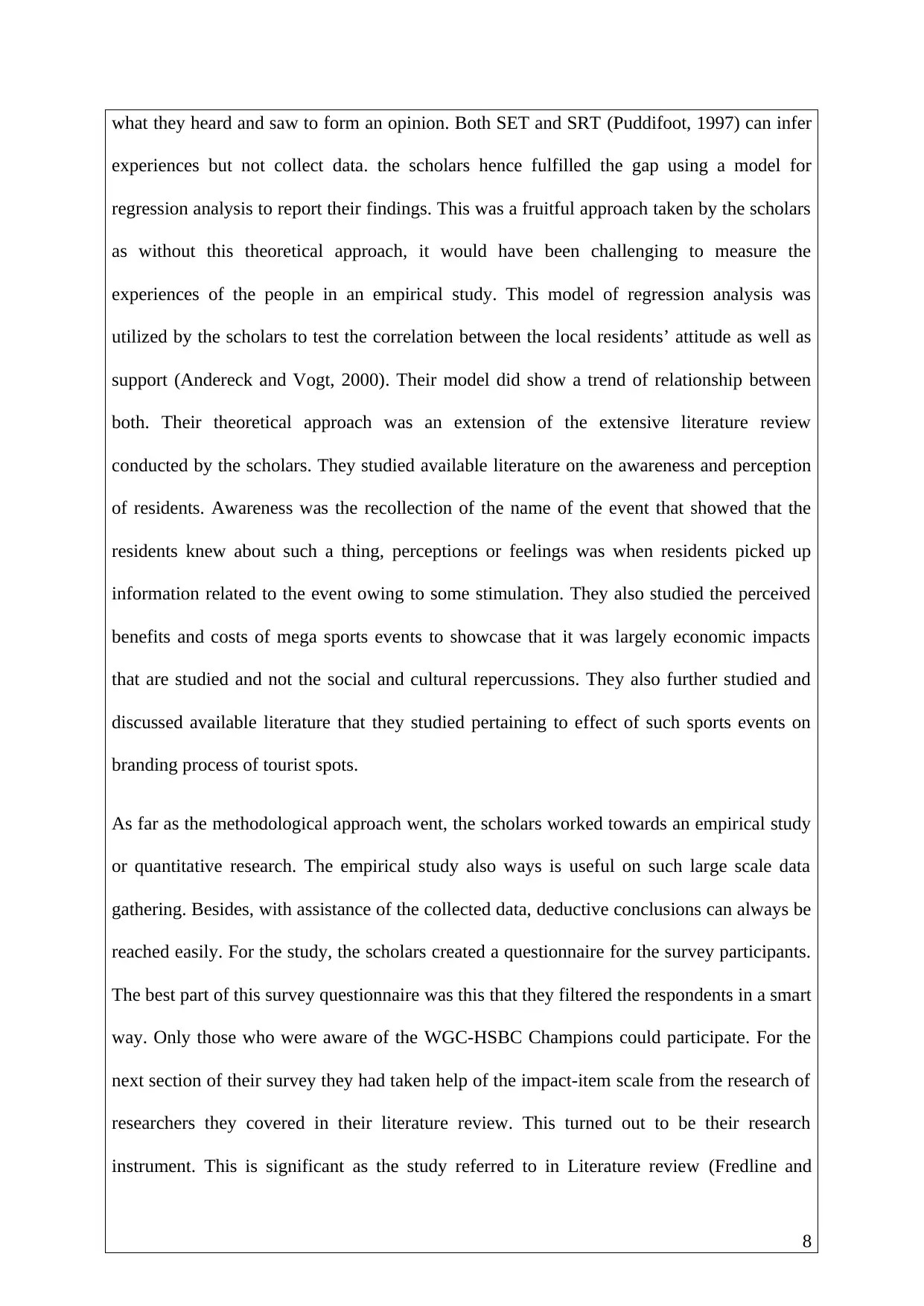
what they heard and saw to form an opinion. Both SET and SRT (Puddifoot, 1997) can infer
experiences but not collect data. the scholars hence fulfilled the gap using a model for
regression analysis to report their findings. This was a fruitful approach taken by the scholars
as without this theoretical approach, it would have been challenging to measure the
experiences of the people in an empirical study. This model of regression analysis was
utilized by the scholars to test the correlation between the local residents’ attitude as well as
support (Andereck and Vogt, 2000). Their model did show a trend of relationship between
both. Their theoretical approach was an extension of the extensive literature review
conducted by the scholars. They studied available literature on the awareness and perception
of residents. Awareness was the recollection of the name of the event that showed that the
residents knew about such a thing, perceptions or feelings was when residents picked up
information related to the event owing to some stimulation. They also studied the perceived
benefits and costs of mega sports events to showcase that it was largely economic impacts
that are studied and not the social and cultural repercussions. They also further studied and
discussed available literature that they studied pertaining to effect of such sports events on
branding process of tourist spots.
As far as the methodological approach went, the scholars worked towards an empirical study
or quantitative research. The empirical study also ways is useful on such large scale data
gathering. Besides, with assistance of the collected data, deductive conclusions can always be
reached easily. For the study, the scholars created a questionnaire for the survey participants.
The best part of this survey questionnaire was this that they filtered the respondents in a smart
way. Only those who were aware of the WGC-HSBC Champions could participate. For the
next section of their survey they had taken help of the impact-item scale from the research of
researchers they covered in their literature review. This turned out to be their research
instrument. This is significant as the study referred to in Literature review (Fredline and
8
experiences but not collect data. the scholars hence fulfilled the gap using a model for
regression analysis to report their findings. This was a fruitful approach taken by the scholars
as without this theoretical approach, it would have been challenging to measure the
experiences of the people in an empirical study. This model of regression analysis was
utilized by the scholars to test the correlation between the local residents’ attitude as well as
support (Andereck and Vogt, 2000). Their model did show a trend of relationship between
both. Their theoretical approach was an extension of the extensive literature review
conducted by the scholars. They studied available literature on the awareness and perception
of residents. Awareness was the recollection of the name of the event that showed that the
residents knew about such a thing, perceptions or feelings was when residents picked up
information related to the event owing to some stimulation. They also studied the perceived
benefits and costs of mega sports events to showcase that it was largely economic impacts
that are studied and not the social and cultural repercussions. They also further studied and
discussed available literature that they studied pertaining to effect of such sports events on
branding process of tourist spots.
As far as the methodological approach went, the scholars worked towards an empirical study
or quantitative research. The empirical study also ways is useful on such large scale data
gathering. Besides, with assistance of the collected data, deductive conclusions can always be
reached easily. For the study, the scholars created a questionnaire for the survey participants.
The best part of this survey questionnaire was this that they filtered the respondents in a smart
way. Only those who were aware of the WGC-HSBC Champions could participate. For the
next section of their survey they had taken help of the impact-item scale from the research of
researchers they covered in their literature review. This turned out to be their research
instrument. This is significant as the study referred to in Literature review (Fredline and
8
⊘ This is a preview!⊘
Do you want full access?
Subscribe today to unlock all pages.

Trusted by 1+ million students worldwide
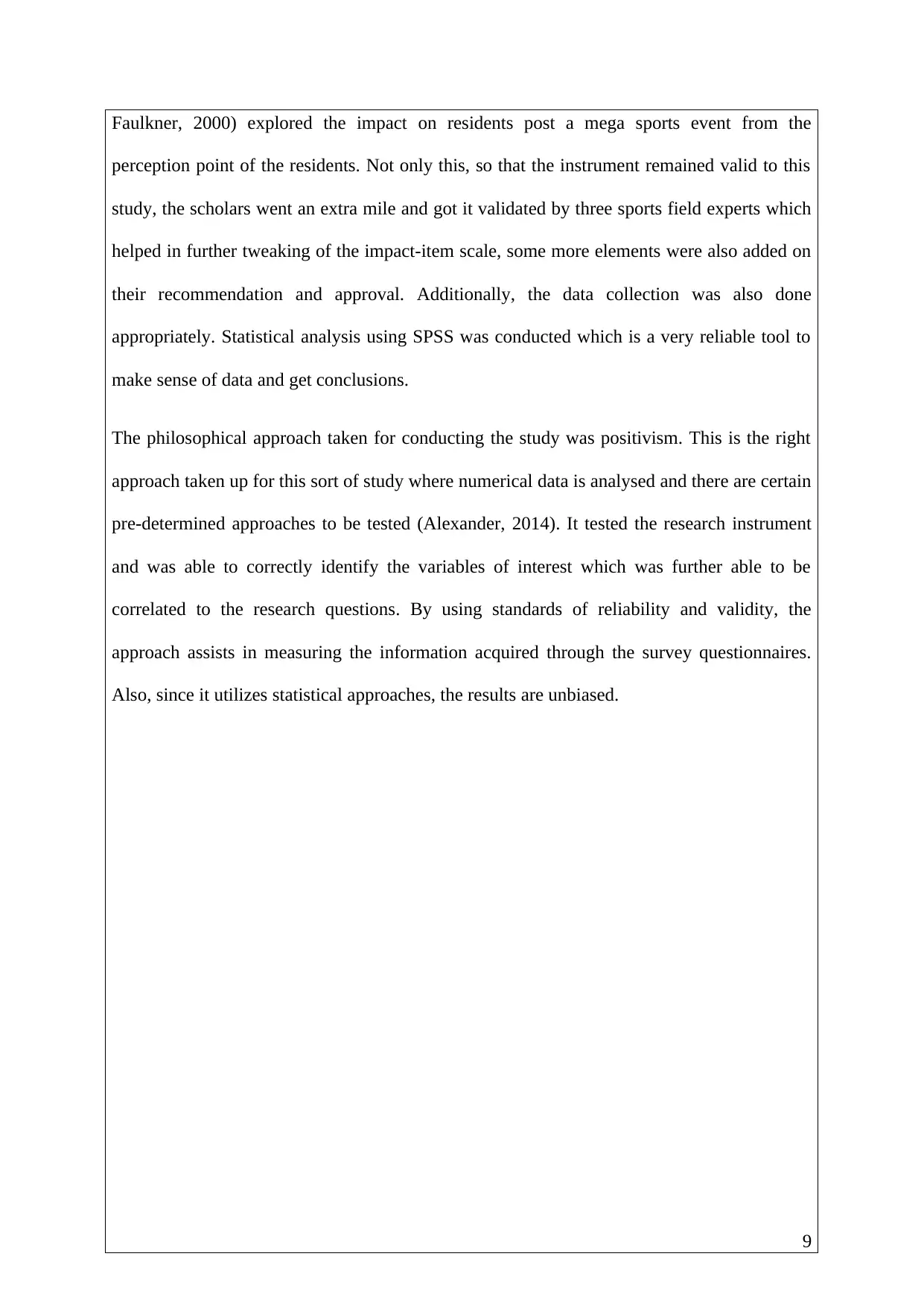
Faulkner, 2000) explored the impact on residents post a mega sports event from the
perception point of the residents. Not only this, so that the instrument remained valid to this
study, the scholars went an extra mile and got it validated by three sports field experts which
helped in further tweaking of the impact-item scale, some more elements were also added on
their recommendation and approval. Additionally, the data collection was also done
appropriately. Statistical analysis using SPSS was conducted which is a very reliable tool to
make sense of data and get conclusions.
The philosophical approach taken for conducting the study was positivism. This is the right
approach taken up for this sort of study where numerical data is analysed and there are certain
pre-determined approaches to be tested (Alexander, 2014). It tested the research instrument
and was able to correctly identify the variables of interest which was further able to be
correlated to the research questions. By using standards of reliability and validity, the
approach assists in measuring the information acquired through the survey questionnaires.
Also, since it utilizes statistical approaches, the results are unbiased.
9
perception point of the residents. Not only this, so that the instrument remained valid to this
study, the scholars went an extra mile and got it validated by three sports field experts which
helped in further tweaking of the impact-item scale, some more elements were also added on
their recommendation and approval. Additionally, the data collection was also done
appropriately. Statistical analysis using SPSS was conducted which is a very reliable tool to
make sense of data and get conclusions.
The philosophical approach taken for conducting the study was positivism. This is the right
approach taken up for this sort of study where numerical data is analysed and there are certain
pre-determined approaches to be tested (Alexander, 2014). It tested the research instrument
and was able to correctly identify the variables of interest which was further able to be
correlated to the research questions. By using standards of reliability and validity, the
approach assists in measuring the information acquired through the survey questionnaires.
Also, since it utilizes statistical approaches, the results are unbiased.
9
Paraphrase This Document
Need a fresh take? Get an instant paraphrase of this document with our AI Paraphraser
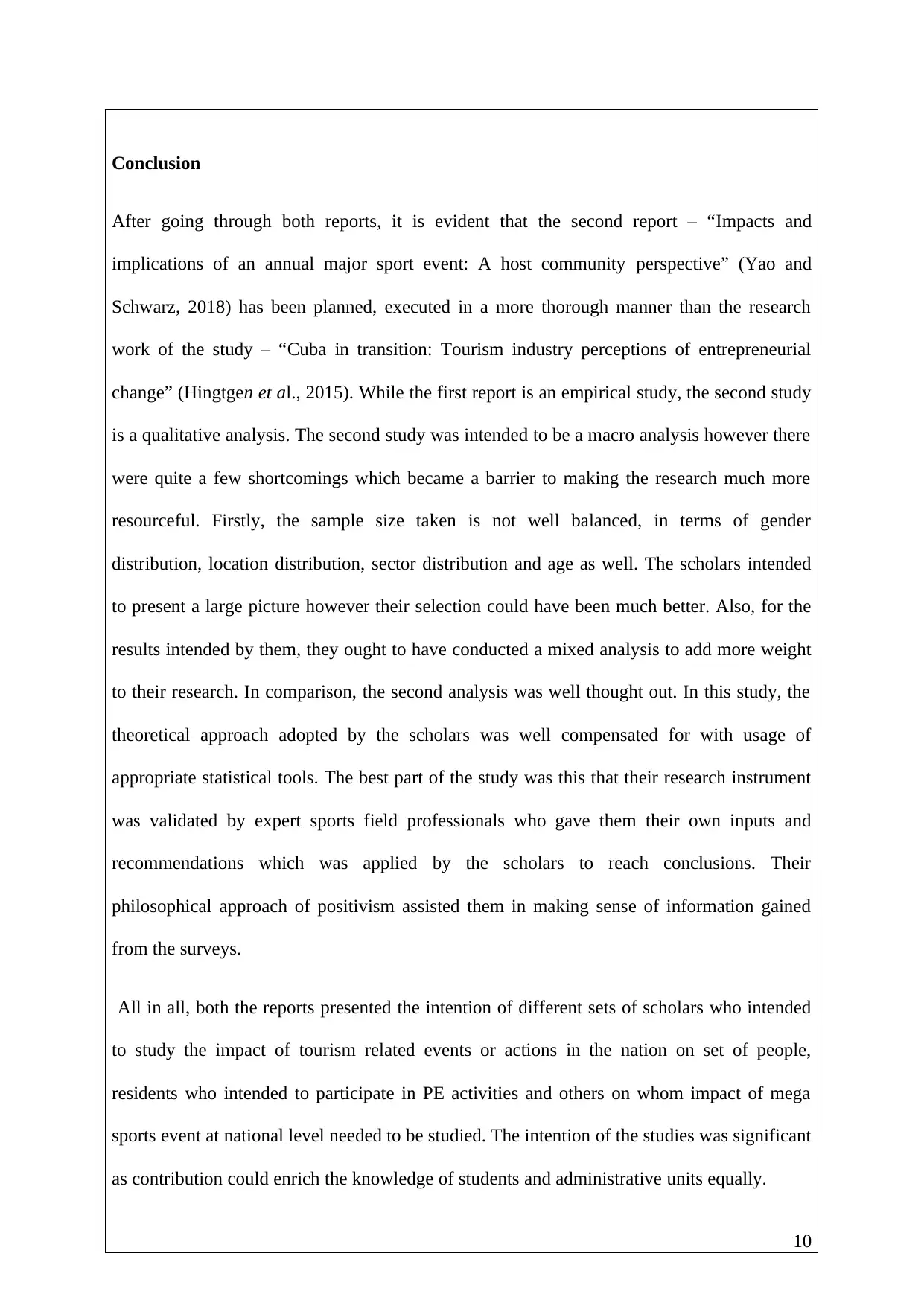
Conclusion
After going through both reports, it is evident that the second report – “Impacts and
implications of an annual major sport event: A host community perspective” (Yao and
Schwarz, 2018) has been planned, executed in a more thorough manner than the research
work of the study – “Cuba in transition: Tourism industry perceptions of entrepreneurial
change” (Hingtgen et al., 2015). While the first report is an empirical study, the second study
is a qualitative analysis. The second study was intended to be a macro analysis however there
were quite a few shortcomings which became a barrier to making the research much more
resourceful. Firstly, the sample size taken is not well balanced, in terms of gender
distribution, location distribution, sector distribution and age as well. The scholars intended
to present a large picture however their selection could have been much better. Also, for the
results intended by them, they ought to have conducted a mixed analysis to add more weight
to their research. In comparison, the second analysis was well thought out. In this study, the
theoretical approach adopted by the scholars was well compensated for with usage of
appropriate statistical tools. The best part of the study was this that their research instrument
was validated by expert sports field professionals who gave them their own inputs and
recommendations which was applied by the scholars to reach conclusions. Their
philosophical approach of positivism assisted them in making sense of information gained
from the surveys.
All in all, both the reports presented the intention of different sets of scholars who intended
to study the impact of tourism related events or actions in the nation on set of people,
residents who intended to participate in PE activities and others on whom impact of mega
sports event at national level needed to be studied. The intention of the studies was significant
as contribution could enrich the knowledge of students and administrative units equally.
10
After going through both reports, it is evident that the second report – “Impacts and
implications of an annual major sport event: A host community perspective” (Yao and
Schwarz, 2018) has been planned, executed in a more thorough manner than the research
work of the study – “Cuba in transition: Tourism industry perceptions of entrepreneurial
change” (Hingtgen et al., 2015). While the first report is an empirical study, the second study
is a qualitative analysis. The second study was intended to be a macro analysis however there
were quite a few shortcomings which became a barrier to making the research much more
resourceful. Firstly, the sample size taken is not well balanced, in terms of gender
distribution, location distribution, sector distribution and age as well. The scholars intended
to present a large picture however their selection could have been much better. Also, for the
results intended by them, they ought to have conducted a mixed analysis to add more weight
to their research. In comparison, the second analysis was well thought out. In this study, the
theoretical approach adopted by the scholars was well compensated for with usage of
appropriate statistical tools. The best part of the study was this that their research instrument
was validated by expert sports field professionals who gave them their own inputs and
recommendations which was applied by the scholars to reach conclusions. Their
philosophical approach of positivism assisted them in making sense of information gained
from the surveys.
All in all, both the reports presented the intention of different sets of scholars who intended
to study the impact of tourism related events or actions in the nation on set of people,
residents who intended to participate in PE activities and others on whom impact of mega
sports event at national level needed to be studied. The intention of the studies was significant
as contribution could enrich the knowledge of students and administrative units equally.
10
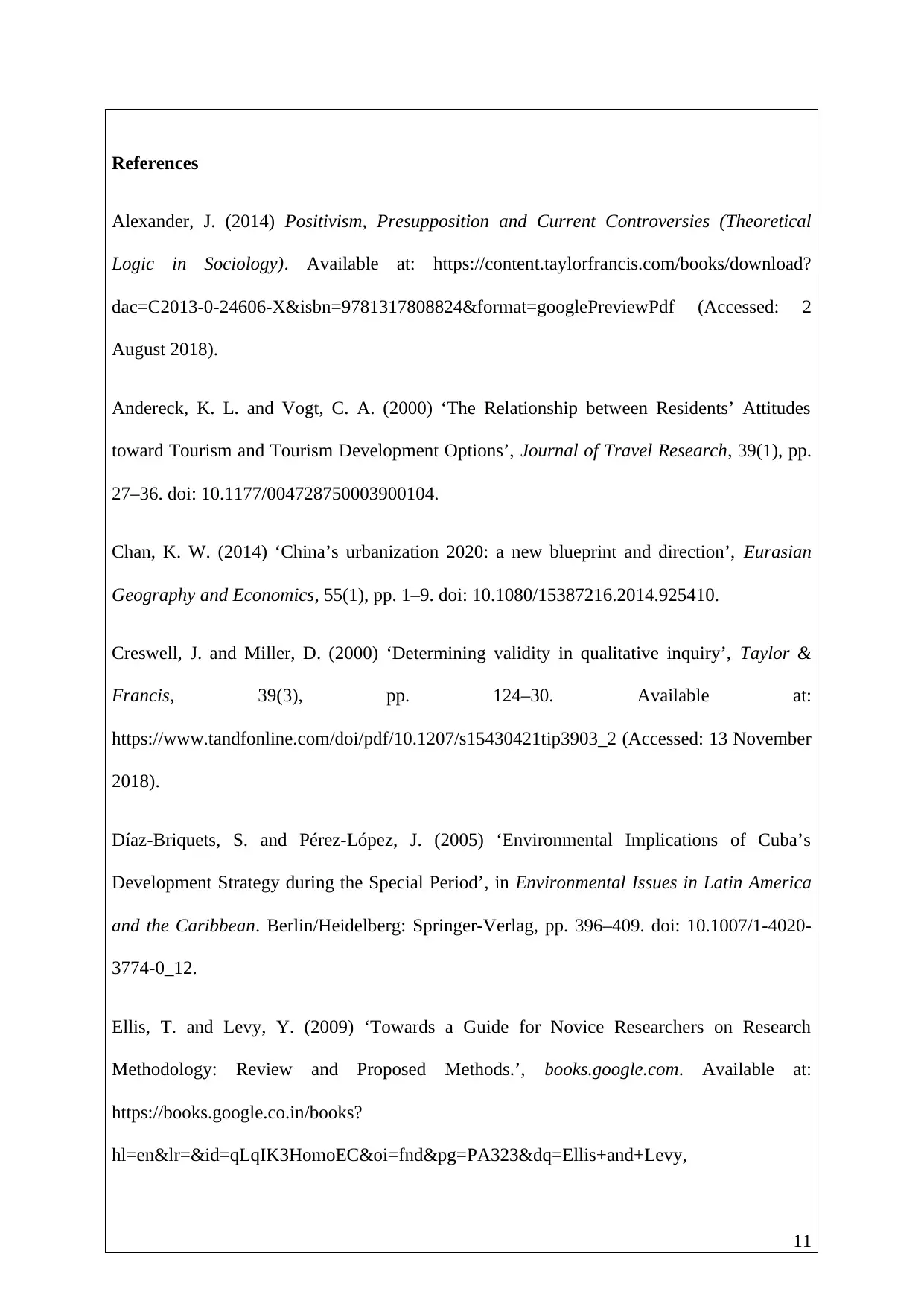
References
Alexander, J. (2014) Positivism, Presupposition and Current Controversies (Theoretical
Logic in Sociology). Available at: https://content.taylorfrancis.com/books/download?
dac=C2013-0-24606-X&isbn=9781317808824&format=googlePreviewPdf (Accessed: 2
August 2018).
Andereck, K. L. and Vogt, C. A. (2000) ‘The Relationship between Residents’ Attitudes
toward Tourism and Tourism Development Options’, Journal of Travel Research, 39(1), pp.
27–36. doi: 10.1177/004728750003900104.
Chan, K. W. (2014) ‘China’s urbanization 2020: a new blueprint and direction’, Eurasian
Geography and Economics, 55(1), pp. 1–9. doi: 10.1080/15387216.2014.925410.
Creswell, J. and Miller, D. (2000) ‘Determining validity in qualitative inquiry’, Taylor &
Francis, 39(3), pp. 124–30. Available at:
https://www.tandfonline.com/doi/pdf/10.1207/s15430421tip3903_2 (Accessed: 13 November
2018).
Díaz-Briquets, S. and Pérez-López, J. (2005) ‘Environmental Implications of Cuba’s
Development Strategy during the Special Period’, in Environmental Issues in Latin America
and the Caribbean. Berlin/Heidelberg: Springer-Verlag, pp. 396–409. doi: 10.1007/1-4020-
3774-0_12.
Ellis, T. and Levy, Y. (2009) ‘Towards a Guide for Novice Researchers on Research
Methodology: Review and Proposed Methods.’, books.google.com. Available at:
https://books.google.co.in/books?
hl=en&lr=&id=qLqIK3HomoEC&oi=fnd&pg=PA323&dq=Ellis+and+Levy,
11
Alexander, J. (2014) Positivism, Presupposition and Current Controversies (Theoretical
Logic in Sociology). Available at: https://content.taylorfrancis.com/books/download?
dac=C2013-0-24606-X&isbn=9781317808824&format=googlePreviewPdf (Accessed: 2
August 2018).
Andereck, K. L. and Vogt, C. A. (2000) ‘The Relationship between Residents’ Attitudes
toward Tourism and Tourism Development Options’, Journal of Travel Research, 39(1), pp.
27–36. doi: 10.1177/004728750003900104.
Chan, K. W. (2014) ‘China’s urbanization 2020: a new blueprint and direction’, Eurasian
Geography and Economics, 55(1), pp. 1–9. doi: 10.1080/15387216.2014.925410.
Creswell, J. and Miller, D. (2000) ‘Determining validity in qualitative inquiry’, Taylor &
Francis, 39(3), pp. 124–30. Available at:
https://www.tandfonline.com/doi/pdf/10.1207/s15430421tip3903_2 (Accessed: 13 November
2018).
Díaz-Briquets, S. and Pérez-López, J. (2005) ‘Environmental Implications of Cuba’s
Development Strategy during the Special Period’, in Environmental Issues in Latin America
and the Caribbean. Berlin/Heidelberg: Springer-Verlag, pp. 396–409. doi: 10.1007/1-4020-
3774-0_12.
Ellis, T. and Levy, Y. (2009) ‘Towards a Guide for Novice Researchers on Research
Methodology: Review and Proposed Methods.’, books.google.com. Available at:
https://books.google.co.in/books?
hl=en&lr=&id=qLqIK3HomoEC&oi=fnd&pg=PA323&dq=Ellis+and+Levy,
11
⊘ This is a preview!⊘
Do you want full access?
Subscribe today to unlock all pages.

Trusted by 1+ million students worldwide
1 out of 17
Your All-in-One AI-Powered Toolkit for Academic Success.
+13062052269
info@desklib.com
Available 24*7 on WhatsApp / Email
![[object Object]](/_next/static/media/star-bottom.7253800d.svg)
Unlock your academic potential
Copyright © 2020–2026 A2Z Services. All Rights Reserved. Developed and managed by ZUCOL.

